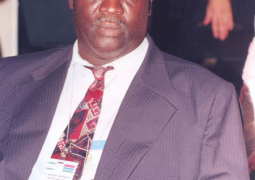The people of Uganda have long struggled to bury the worst of their history, but after the violent reign of Idi Amin, reminders were never far from view. In 2000, lawyer Duncan Laki came across a clue to his father’s 1972 disappearance, and the ensuing search ultimately led him to a shallow grave- and the three old soldiers, including Amin’s military chief. Laki’s discovery resulted in a trial that, in the end, offered Ugandans the reckoning they had long been denied. A detective story, a tale of fathers and sons, and a political history, this book is above all an illumination of the wounded societies of modern Africa and an exploration of how- and whether- the past can ever be laid to rest. This is an apt summary of this very interesting book.
Richard Rice, the author, uses the tools of an investigative journalist to unearth some of the murky excesses of Amin’s Uganda, with brilliant success. He begins by giving a historic and geographical background to Uganda: it being part of the great East African Rift Valley, and the ‘geological tumult’p.7, that comes with such a location such as numerous lakes, mountains and lush forests, which will have a dark impact on the stability of Uganda in later years. This benign climate will also attract Europeans to the land, who would come in droves, first as missionaries, then traders and from the late 1800s,as colonisers, p.8. Soon after independence in 1962, Uganda would be convulsed by ethnic and regional crises which pitted Obote and the Buganda, p.9. This chaos paved the way for the brutal rule of Amin from 1971-1979.
In many ways, this book revisits the history of Uganda during the rule of Amin. The author takes us through the numerous excesses such as mass executions of suspected opponents, the theatrics of Amin such as riding to a meeting on a hammock carried by Whites, his numerous wives and so on. The experienced reader would realise that much of this had been written about by earlier authors on Amin and his rule such as his former health minister Henry Kyemba’s State of Blood published while Amin was still in power. Western journalists who were forever fascinated by Amin, had also written thousands of columns on him.
However, Rice adds to the literature because he follows how victims have tried to seek justice for atrocities committed during the reign of Amin. He visited old sites, spoke to participants, and unearthed long lost written details to assemble this harrowing tale of life under Idi Amin. In other areas, the author reconstructs details and events based on witness accounts. This mixture of factual details and semi-fictional episodes further makes the book a good read.
The book is illustrated by archival and contemporary photos which increases the immersion of the reader into the storyline. The detail notes and exhaustive list of informants supplied at the back of the book gives an academic aura and allows future researchers on the never stale story of Amin and his brutal rule, excellent leads to follow.
On August 16, 2003, Amin died in Saudia at around 80 years. Yet, even this did not end the interest and controversy on his rule. ‘Now you as weak as we are! You are one of us. You used to be honoured with the music of harps, but now you are in the world of the dead. You lie on a bed of maggots and are covered with a blanket of worms’, was how one Ugandan newspaper remembered him.
Rice’s book is a worthy addition to the large literature on Amin’s Uganda, and it does not disappoint.
Available at Timbooktoo, tel 4494345.



